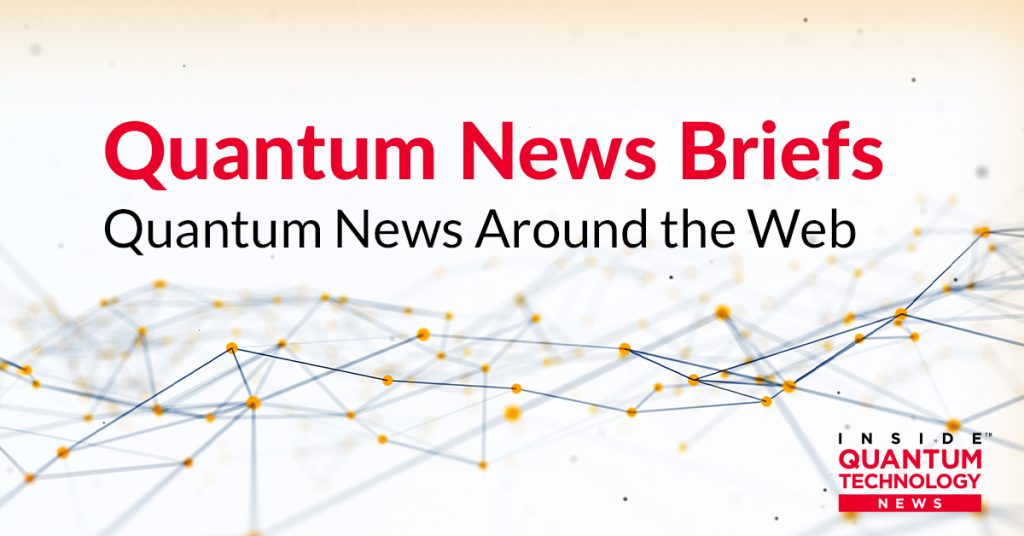Quantum News Briefs opens today with the announcement from Quantum Machines that it has been selected by Israel Innovation Authority to lead the establishment of the Israel Quantum Computing Center followed by information on Quantum Xchange’s hosted “How-To” Government Resource Center Detailing Scalable Quantum-Safe Security Solutions”. Info on the QIS’ Second Annual Quantum Career, September 14 is next with even MORE.
Quantum Machines Selected to Build Israel’s National Quantum Computing Center
Quantum Machines announced on Monday that it has been selected by the Israel Innovation Authority (IIA) to lead the establishment of the Israel Quantum Computing Center. The center is part of the Israel National Quantum Initiative (INQI) and will host Israel’s first fully functioning quantum computer that is available to the commercial and research communities. Quantum Machines will lead the establishment of the center together with a consortium of top Israeli and international companies at the forefront of quantum computing globally.
Quantum Machines’ Quantum Orchestration Platform will be at the heart of the INQI quantum computer, providing a high degree of flexibility, extensibility and scalability. The platform will enable the use of a variety of qubit technologies, while a component-based approach will allow for parts of the system to be upgraded to future quantum technologies. This strategy will ensure that the quantum computer remains at the cutting edge as quantum technology continues to advance. The quantum computer will also feature integration with High-Performance Computing (HPC) and an innovation testbed for fostering the development of novel quantum technologies.
“We look forward to working with the Israel Innovation Authority (IIA) to lead the development of the country’s first fully functioning quantum computing center,” said Itamar Sivan, co-founder and CEO of Quantum Machines. “The open architecture approach that Quantum Machines and our world-leading partners in the consortium enable, will ensure compatibility with the quantum technologies of the future. This will allow the center’s quantum computer to scale from tens of qubits today, to hundreds and thousands of qubits in the next few years. Our goal is to give Israeli companies access to the most advanced quantum technologies and services so that they can develop deep quantum expertise across industry and academia. This expertise will allow Israeli companies across a broad range of sectors and industries to gain a leading global position.”
*****
Quantum Xchange Hosts “How-To” Government Resource Center Detailing Scalable Quantum-Safe Security Solutions
Large-scale attacks on critical infrastructure including SolarWinds, Colonial Pipeline, and Microsoft Exchange illustrate the considerable threats facing federal agencies. Now, with the National Security Memorandum (NSM-8) agency CIOs are required to evaluate and deploy Quantum Resistant Algorithms (QRA).
Because government data security requirements have a much longer shelf-life than other industries – up to 50 years in the case of official intelligence – it is reasonable to assume this data may be vulnerable to quantum attack if not protected properly today. To ensure critical data and communications networks are protected for the long term, federal agencies and their partners should evaluate and deploy quantum-safe encryption methods now — a sentiment now shared by the leadership in Washington.
*****
National Quantum Information Science Research Centers to Host Virtual Career Fair, Sept. 14
The QIS Career Fair is being organized by the Brookhaven National Laboratory-led Co-design Center for Quantum Advantage (C2QA). Direct questions about this event to Career Fair Coordinator Diana Murphy at dtmurphy@bnl.gov.
Falcon Algorithm Co-Developed with Thales Selected by NIST as New Standard in Post-Quantum Cryptography
Falcon, selected for its extremely strong security and high bandwidth efficiency, will be included in the NIST’s post-quantum cryptography standards expected to be fully defined within the next two years.
Falcon was co-developed by Thales together with academic and industrial partners from France (University of Rennes 1, PQShield SAS), Switzerland (IBM), Canada (NCC Group) and the US (Brown University, Qualcomm). It was selected by NIST alongside two other algorithms as standard for digital signatures, while a fourth algorithm was deemed standard for public key encryption/KEM. Thales was the only technology group serving the defence, aerospace and digital identity markets, to take part in the NIST competition. The selection of Falcon, following a 5-year long global competition demonstrates Thales’ leading position in cybersecurity, cutting-edge technology and research.
Thales has been at the forefront of post-quantum cryptography research since 2013, and the selection of the Falcon algorithm by NIST is great recognition of the excellent co-development work and expertise of our crypto teams. We will pursue our on-going research in France and Europe to develop innovative, trusted solutions that will be quantic-resistant, without compromising performance, and are already helping our customers in their transition to a new generation of security solutions, to avert a future ‘crypto-apocalypse’.said Pierre-Yves Jolivet, Vice-President, Cyber Defence Solutions at Thales.
*****
NVidia’s Hybrid Platform Designed to Make Quantum Computing More Accessible
Quantum computing has no compatibility with current applications. You’re not just going to rewrite or recompile an application on a quantum computer. You have to write the whole thing over from scratch to completely take advantage of the new architecture. No one is going to find that appealing, and that’s what Nvidia is trying to address.
This is not Nvidia’s first dance in the quantum computing space. About a year ago, the company released cuQuantum, a software development kit (SDK) for accelerating quantum workflows using the Tensor Cores in its GPUs along with various libraries and tools optimized for such jobs as quantum circuit simulations.
*****
